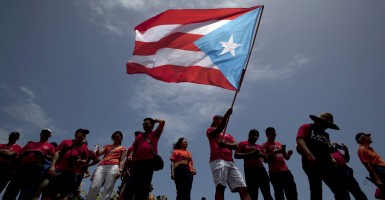The inability of Puerto Rican governments to live within their own means is, of course, the reason why the island finds itself with a $70 billion debt it can’t pay.
But as we apportion blame, let’s not forget the federal government’s role in creating our own “mini-Greece.”
From Franklin D. Roosevelt on down, we have made Puerto Rico a laboratory for liberal policies. It wasn’t just benign neglect on the part of Washington that has produced a crippling culture of dependence.
As I wrote in my book “A Race for the Future”,
The United States must assume its fair share of responsibility for the continuation of this unhealthy culture of dependency. It was, if anything, deepened by progressive policies imposed from Washington. Starting in 1932 and for several decades to come, Puerto Rico became a workshop for the woolliest New Deal policies ever produced by the central planners who surrounded President Franklin Delano Roosevelt.
The United States did right by Puerto Rico when it liberated it from Spanish imperial rule in 1898.
Since then, the island has been in a legal limbo, not a colony, but not quite a state either.
It is called a commonwealth in English, though the Spanish term, “un estado libre asociado”—a free associated state—is closer to the actual situation.
But the U.S. federal government didn’t have to shower the island with statist, welfare policies. As happens everywhere liberals’ policies are enacted, the results have not been good; this is why Puerto Rico’s statistics are dire.
According to federal statistics, for example, Puerto Rico has a food stamps participation rate of close to 40 percent, compared to our already very high, Obama-era rate of 13.7 percent.
As for Social Security disability payments, they are received by 21 percent of workers, a figure that is in fact low when one considers that according to an audit by the Social Security Administration, federal regulations require “that disability adjudicators allow a disability claim based on a claimant’s inability to understand the English language for claimants residing in Puerto Rico.”
This in an island where the same report states that “about 84 percent of the residents reported they did not speak English ‘very well.’”
The labor participation rate is also an appalling 40 percent (compared to the Obama-era 63 percent in the U.S. mainland).
A report commissioned by the Puerto Rican government last month makes clear that the federal government practically pays Puerto Ricans not to work.
Puerto Rican welfare policies calibrate for the U.S. economy, not for the tiny island in the Caribbean.
As the authors of the report, Anne Krueger, Ranjit Teja and Andrew Wolfe put it, “Workers are disinclined to take up jobs because the welfare system provides generous benefits that often exceed what minimum wage employment yields; one estimate shows that a household of three eligible for food stamps, AFDC, Medicaid and utilities subsidies could receive $1,743 per month—as compared to a minimum wage earner’s take—home earnings of $1,159.”
But this is nothing new: The Puerto Rican LPR hasn’t broken 50 percent since 1950. This was soon after FDR appointed one of his favorites, Rexford Guy Tugwell, as governor of the island. As I wrote in my book,
It was Puerto Rico’s misfortune that early on the island caught the eye of this good-looking, most radical member of Roosevelt’s inner circle. Roosevelt eventually appointed Tugwell governor of Puerto Rico in 1941, the last Anglo politician sent by Washington to run the executive branch of the island’s government … When the president appointed him governor of Puerto Rico, Tugwell was given a free hand to experiment with a whole island. To a central planner this was the equivalent of a 7-year-old waking up on Christmas morning to find a train circling the tree, smoke spewing from the caboose. The result, says Jorge Bonilla, a Puerto Rican conservative firebrand who sought the Republican nomination in Florida’s 9th District in 2014, was that ‘Puerto Rico became a laboratory for every New Deal policy imaginable. And it is these liberal policies that put in place all sorts of dysfunctions, causing a breakdown of the family in Puerto Rico.’
So let’s not be too tough on Puerto Ricans. Yes, governments on the island will from now on have to learn to live within their means, and borrow less.
But it would also help an awful lot if we stopped killing the island’s economy with so much kindness.



























